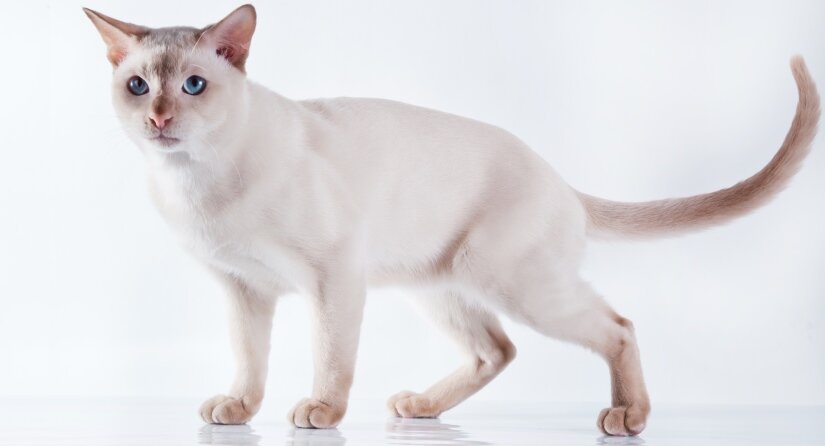The Tonkinese is a cross between the Burmese and the Siamese cat breeds. Tonkin refers to a region of Indochina. This cat breed comes from Southeast Asia. Cat breeders wanted to breed a cat that had a medium body size, a less shrill voice, but with the same intelligence and loyalty as the Burmese and Siamese cat breeds.




and Thailand
Brief History
The Tonkinese has been around since the early nineteenth century. Wong Mau, a Tonkinese cat, was imported in to the U.S in 1930. She was a genetic crossbreed of both the Siamese and the Burmese. Many of today’s Tonkinese cats can be traced back to Wong Mau, the first Tonkinese cat. Margaret Conroy and Jane Barletta, both crossed the Siamese with the Burmese. Conroy was in Canada, and Barletta, in the U.S. They both wanted to achieve lively personalities with the combination of both parent’s unique appearance. By 2001, the Tonkinese was moved from a crossbreed, to an established cat breed.
Physical Description
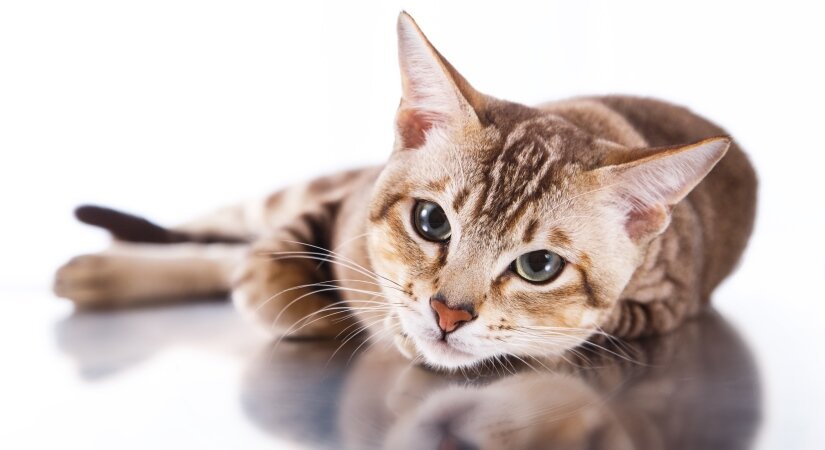
The Tonkinese is a medium-sized cat breed. With a slim tail and legs, that are proportionate to the body size, the Tonkinese has distinctively oval-shaped paws. The head is slightly wedge-shaped, and oval, the muzzle is blunt, and the eyes are almond-shaped. The ears are set towards the outer part of the head. The American Tonkinese has a much rounder head with a shorter body. The body is sturdier. Today’s Tonk breeders try to avoid defective genes that were carried in the original Burmese cat breed. Older breeders used selective breeding to avoid these defective genes. The Cat Fanciers Association (CFA) recognizes the Tonkinese as having four base colors. These are:
- Natural (medium brown)
- Champagne
- Blue
- Platinum
The International Cat Association (TICA) adds in some extra colors. These are:
- Red
- Cream
- Caramel
- Apricot
- Tortoishell
- Cinnamon
- Fawn
There are also various patterns that are recognized. These include the point, solid, and mink. Points will have blue eyes and a light body. Solid is similar to the Burmese, with a solid color throughout the body, and green eyes. The minks carry aquamarine colored eyes, and the coat color is a combination of both the mink and solid.
Temperament
The Tonk loves to jump up on furniture, and can jump high. This cat breed is energetic and agile. The Tonk can play fetch, and rather enjoys learning new cat tricks with clicker training. This cat breed is a friendly and intelligent cat breed. This is a people- driven cat breed that constantly wants to give love and get love.
The Tonk loves to play, and will follow you for attention. An assortment of interactive cat toys is recommended for the Tonk. This cat breed is very sociable. They enjoy being around family, and do not do well being alone all day. They are a one-person cat breed that bond closely with their pet parent. The Tonk is vocal, and are known to be persistent when trying to get your attention. This very intelligent and affectionate cat breed does well with apartment and indoor living. The Tonk may be prone to feline depression and anxiety if left alone for long periods of time. This cat breed does well with plenty of TLC!
Special Needs
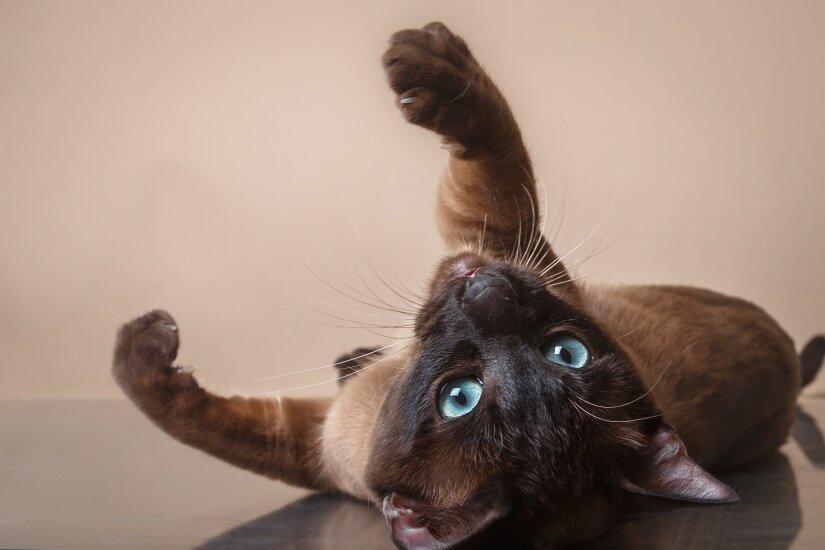
Tonk kittens should be vaccinated according to a vaccination schedule. This will begin at two months of age. Intestinal parasites are also common in kittens, since the Tonk mother cat may pass down larvae through the placenta or milk. Your veterinarian will treat your kitten with a broad-spectrum wormer. You will also need to consult with your veterinarian as to the safest antiparasitic products for your Tonk.
You may also be faced with several health problems after adoption. These could be linked to behavioral problems. Consult with your veterinarian for a behavioral history of your senior cat if working through issues. Understanding why your Tonk is having problems is important, so that your veterinarian can treat them.
Your Tonk will need to socialize. If getting a kitten, socialization should commence during kittenhood. Your Tonk kitten should be handled before reaching ten weeks of age. Cats that have not had the proper amount of socialization may avoid human contact.
When introducing your new Tonk to other pets in the home, it should be done gradually and over the course of a few days. They should be able to smell each other through safety gates, and then held while getting introduced. Allow pets together for short periods of time if they are calm, and gradually increase the amount of time that the pets spend together. Within multi-pet households, patience and calmness is important.
Your Tonk will also need to be spayed or neutered. Your cat needs to be protected from household dangers like cleaning supplies, toxic plants, electrical cords, and aggressive animals. Cats are carnivores, and will need a high-quality diet with plenty of fresh water every day. Exercise can be achieved through a variety of play toys that encourage running and a game of chase. Sedentary cats may be prone to obesity, and health problems later on in life. Understanding the responsibilities of cat parenting before getting a cat is important. Keeping your Tonk indoors as an indoor cat will also keep them safer.
Possible Health Concerns
The Tonkinese is a healthy and active cat breed that may be susceptible to the following health conditions:
- Feline Asthma & Bronchial Disease: Allergic asthma is found in cats more often than dogs. It will affect cats mostly in the summer months. The attacks can be severe. Asthma occurs when the breathing passages are constricted. This is triggered by the release of compounds like histamines. Consult with your veterinarian. Allergic bronchiolitis is an inflammation of the lower portion of the airway. (bronchioles) This condition may be confused with asthma or lungworm disease. Consult with your veterinarian.
- Aortic Stenosis: It is important to detect heart disease early on in cats. There are certain heart defects which can be helped with surgery. With aortic stenosis, the aorta is affected. This is the large artery that carries blood way from the heart. Obstruction of the aorta will affect blood flow. Treatment will include medications to reduce the signs of heart failure and surgery. Consult with your veterinarian for advice.
- Congenital Megaesophagus: This is an abnormal nerve development in the esophagus. It can also lead to widespread nerve problems. It is common in Siamese cat breeds and cross breeds from the Siamese cat.
- Progressive Retinal Atrophy: This is a group of diseases that cause degeneration of the retina. This also includes inherited abnormalities of the light-sensitive retina layer. Cataracts are common toward the end of PRA. This results in it being difficult to detect underlying diseases of the retina. Consult with your veterinarian.
- Feline Hyperesthesia Syndrome: This is also known as rolling skin disease which is a rare illness in domesticated cats. It results in periods of self-mutilation and agitation. There is also a rippling of the skin when touched. It is a seizure disorder. Consult with your veterinarian for advice. Your cat’s environment will need to be kept as calm as possible when your cat experiences an episode.
- Strabismus (cross-eyes): This is when the eye is misdirected, and one eye will turn either inward or outward. This may be caused by a muscle abnormality or a nerve abnormality that control the eye muscles. This can be present in one eye or in both eyes in cats. It can be present at birth, or it may develop at a later stage in a cat’s life. When occurring later on in life, it may indicate a serious eye problem in your cat. Many cases are congenital in Siamese breeds. Hydrocephalus may also be a cause. Feline leukemia virus also may play a part in strabismus. Trauma, cancer, and inflammation are also factors that may lead to strabismus in cats.
Exercise
The Tonkinese cat breed needs daily exercise combined with plenty of mental stimulation through active play and interaction with people. Cat parents can use cat toys like the Mousr or Cat Dancer to get their cats to play. This will encourage your cat to play.
Finding a variety of mentally stimulating cat toys will allow for your cat to lead a well-balanced life, with the right amount of exercise and mental stimulation. Cat harnesses also allow for daily walks. These need to be gradually introduced until your Siamese is used to his harness. Consult with your veterinarian first.
The Tonk is an intelligent and very affectionate cat breed that does well in most cat friendly environments. That said, this cat breed still needs to play and interact with people., and should not be left alone all day. Cat gyms, cat scratchers, and interactive cat toys within a cat friendly home environment work best for this fabulous cat breed.
Look out for the latest cat toys like Ripple rug play mats, the Feather Whirls, pet cube toys, food trees, turbo scratcher toys, cat companion interactive toys, and electronic motion toys. All these and many more will keep your Tonk kitty entertained when you’re out and about.
Poly Rattan weaved cat scratchers make for longer lasting cat scratching posts. They are more durable, and built to last. Hemp toys for cats are irresistible. Some come with colorful feathers and hemp cord allowing for longer playtime with your feline.
Chasing, hunting, and attacking toys are some of the methods that cats will use when playing with interactive toys. When out shopping for cat toys, opt for safe TPA materials that have no toxic BPA or BHT. Multilevel spinning ball cat toys help cats bat and chase play. Ultimately, what feline pet parents need to achieve is bonding through free play and exercise.
Nutrition
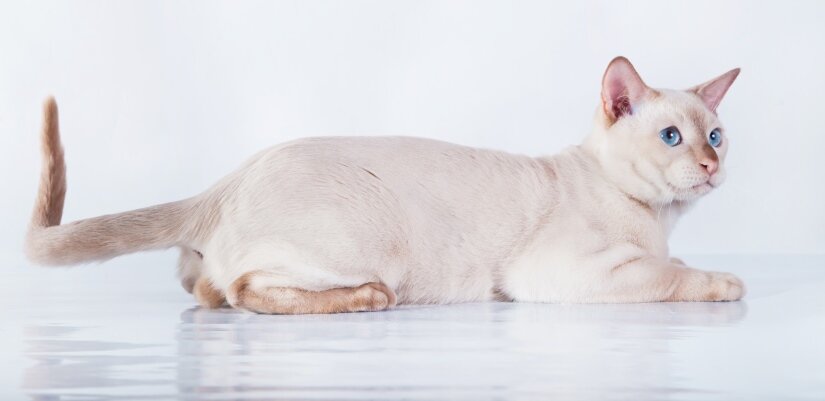
The Tonkinese cat breed will need proper nutrition. That said, a high-quality diet that is appropriate for the specific life stage of the cat is necessary. Protein as an ingredient, needs to come first. Dry cat food is a popular choice because it promotes healthier gums and teeth. Yet wet food is more often recommended by veterinarians because it provides more moisture to cats. Cats don’t drink a lot of water and tend to sometimes get dehydrated. Wet cat food also has its benefits. By choosing a well-known name-brand cat food that has scientific backing, as well as quality control, cat parents can be assured that they are providing a well-balanced diet.
All cat breeds need high-quality fat and protein in their diets. They also need amino acids, including taurine that cannot be found in either human food or dog food. There are also numerous specialty diets for your cat that are formulated specifically for certain medical problems like urinary tract disorder, obesity, or kidney disease.
All cats do well by being fed twice daily. During kittenhood, kittens will need to be fed every few hours. Growing kittens need more calories, nutrients, vitamins, protein, and calories. Your Tonk should be able to enjoy a peaceful meal in a quiet corner of the house. Some cat parents prefer to leave cat kibble out 24/7. When looking for a high-quality cat food, here’s what to look out for:
- No low-quality fillers
- No artificial additives
- Low grade ingredients or toxic ingredients
- All cat food has to be meat-based because all cats are carnivores
- No garlic
- Plant-based ingredients should be listed after the protein-based ingredients
Consult with your veterinarian for the best dietary advice for your Tonk.
Grooming
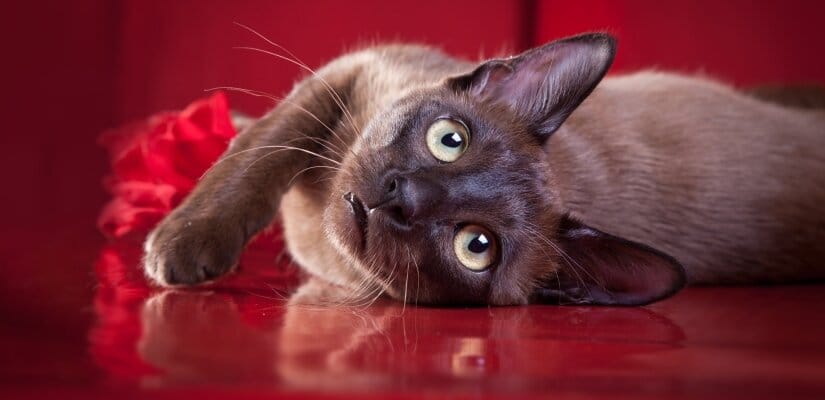
Cat pampering is a norm today with feline pet parents wanting the very best for the cats. Your Tonkinese may be susceptible to skin diseases originating from flea bites, mites, yeast infections, and infections. Opt for natural cat grooming products to help resolve these skin irritants. All cat breeds are highly sensitive. By using grooming wipes and waterless shampoos in between bathing schedules, you’ll have a healthier cat.
The Tonkinese needs daily grooming to remove shedding or dead hair. Because this breed has a short and fine, soft coat, grooming is easy. Stainless steel combs help to remove dead hair. Care must be taken when grooming leg hair and body hair to avoid sensitive areas. Some cats have very sensitive areas along their backs, legs, and belly area. Curry brushes help with grooming, and will remove dead hair and debris from your cat’s coat.
Look for high-quality pet products to decrease shedding, and help prevent hairballs. Products like the Furminator will easily groom through your cat’s coat, and safely remove dead hair without hurting your cat. Soft tip massagers, deluxe nail trimmers, and de-shedding tools all help make cat grooming so much easier.
All cat breeds will groom themselves several times throughout the day. Daily grooming is necessary because it limits the amount of hair that your cat will consume. This helps limit the development of hairballs. Your Tonk will enjoy being groomed. Coat hair always looks best during the cold winter months. Cats that have been spayed or neutered will have great coats year- round. This is because hormonal changes in cats affects coat length and thickness.
Daily cleaning with pet wipes beneath the tail is necessary. Ears should be checked weekly for cleanliness and sensitivity. If there is a build-up of wax and dirt, organisms can lead to an ear infection. Consult with your veterinarian about safe and gentle ear cleaning techniques. Nail trimming is necessary every few weeks. Eyes should also be cleaned gently every morning with cotton wool or a soft wipe. Each eye should be cleaned with different wipes or cotton balls to avoid eye infection contamination in both eyes.
Healthy Tonks need minimal bathing with a gentle cat shampoo. Your cat will need dental care as well. By feeding dry food, and having professional dental cleanings with your veterinarian throughout your cat’s lifetime, your cat will have less of a chance of developing gingivitis or gum disease. Cats should also have their teeth brushed a few times a week with a special feline toothpaste and brush.
Adopting a Tonkinese
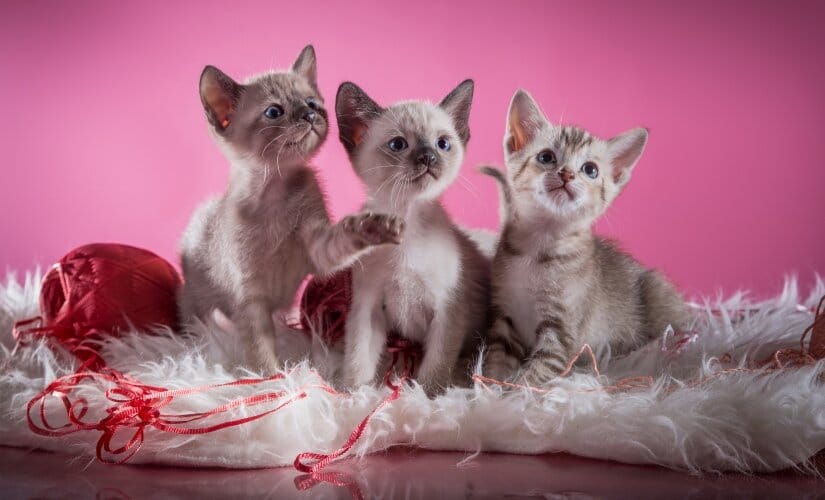
After doing lots of research about the cat breed that you’re wanting to adopt, you may be asking yourself a few questions. That said, consider what characteristics are important to you and your family before purchasing or adopting a feline. Your new cat will become a friend and part of the family for life. Regardless of which breed, or whether you choose to adopt or purchase, being prepared in every way helps achieve a more satisfying experience for both you and your Tonkinese.
Socialization is very important for all cat breeds, no matter how sweet a breed is. With socialization, cats learn how to get along with other cats, animals, and people. That said, your Tonk should never be placed in a dangerous environment or be near aggressive dogs or people. This cat breed needs to spend a fair amount of time with his pet parent and family.
All cat breeds that have not been socialized during kittenhood, and during the latter stages of life will fear humans and avoid human contact. By playing with and providing the best care for your rescue, you’ll be developing a close bond, and working toward reducing, and eventually eliminating any negative feline behaviors with positive clicker training.
Natural feline behaviors like urine marking, soiling outside the litter box, fighting with a new cat,may be behaviors that you’ll have to deal with when bringing your new cat home. If you have other cats at home, they may be territorial, and see the newcomer as a threat. All these problems can be worked through with the help of a good veterinarian and cat behavioral therapist.
That said, the Tonk is one of the most popular cat breeds around the world! With their sensitive, yet feisty personalities, this vocal cat breed has plenty of attitude. Adopting a Tonk will be extremely rewarding! With so many cats up for adoption, it is the only way to go! There are so many cats in shelters today that desperately need a good home. When choosing your cat, ask questions, and look for a great temperament! Some cats like the Tonkinese may be depressed or anxious at shelters, but soon settle down in their new homes, and become very friendly and sociable.
In addition, kittens should be playful and curious. Sickly kittens that have bad odors or plenty of diarrhea stains, and a dull coat need to be seen by a veterinarian as soon as possible. Kittens when ill, can go downhill very quickly. However, the rewards of adopting a sick animal and caring for it are tremendous, provided that good veterinary care is provided right away. Healthy Tonk kittens will also need plenty of care, numerous daily feedings, veterinary check-up visits, socialization, and positive litter box training. Keep in mind that vaccinations and parasite control are an important part of feline health care.
Consider pet health insurance for your cat. With so many great and affordable pet health plans available today, there’s no reason to avoid keeping your pet covered in case of an emergency.
Your Tonk will also need to be protected from household hazards, most especially electrical cables, poisonous plants, medication, and open windows. This cat breed makes for a wonderful adoption! As usual, make sure that children are always gentle and quiet around your cat, and that no aggressive dogs or animals are nearby.
Give your Tonk time to adjust to his new surroundings. As with any cat adoption, make sure that you have the time and resources to take good care of this wonderful cat breed!
Tonkinese Rescue Groups
Tonkinese Cat Club
- Address
- Kent, Great Britain
- Website
- www.tonkinesecatclub.co.uk/rescueandwelfare
- Phone
- (1303) 259203
- contact@tonkinesecatclub.co.uk
Tonkinese Rescue
- Address
- Watkinsville, GA, USA
- Website
- tonkinese.rescueme.org
- Phone
- (800) 8002099
Tonkinese Breeders in the USA
TenderTonks (California)
- Address
- Pleasant Hill, CA
- Website
- www.tendertonks.mysite.com
- Phone
- (951) 7561960
- nancychadwick77@yahoo.com
VivaTonk (California)
- Address
- Southern California
- Website
- www.vivatonk.com
- Phone
- (760) 4926457
- info@syrahgoldens.com
Pendragon Tonkinese (California)
- Address
- San Francisco Bay Area, CA
- Website
- www.pendragontonks.com
- Phone
- (707) 9951125
- quest8@ix.netcom.com
Seaflower Tonkinese (Delaware)
- Address
- Greenwood, DE
- Website
- www.felines.net/seaflower/
- Phone
- (704) 8455253
- seaflower@felines.net
Indian Spring Cats (Columbia)
- Address
- Washington, Columbia
- Website
- www.indianspringcats.com
- dougschar@aol.com
Siam Bali Rags (Florida)
- Address
- Florida
- Website
- www.siambalirags.com
- Phone
- (863) 6754075
- AuntBea@SiamBaliRags.com
Swan Falls Cattery (Idaho)
- Address
- Idaho
- Website
- swanfallscattery.com
- Phone
- (208) 9224949
- 1Summer@mindspring.com
Innocentia Cattery (Michigan)
- Address
- Detroit Area, MI
- Website
- www.innocentia-cats.com
- Phone
- (877) 2287868
- Innocentiacats@aol.com
Vitrina Tonkinese (Minnesota)
- Address
- Greater Twin City Area, MN
- Website
- www.vitrina.us/Vitrina-Tonkinese.htm
- Phone
- (715) 2734249
- valori@vitrina.us
Prairieridge (North Dakota)
- Address
- Sheldon, ND
- Website
- prairieridgeabys.com
- Phone
- (701) 8823289
- whispering@mlgc.com
Minkitty (Ohio)
- Address
- Cleveland, OH
- Website
- www.minkitty.com
- Phone
- (440) 3319533
- nmikita@cox.net
Ricela (Ohio)
- Address
- New Matamoras, OH
- Website
- www.ricelacattery.com
- Phone
- (740) 8642185
- kish@ricelacattery.com
Breeders in the Canada
No 9 Tonkinese
- Address
- Elmira, Ontario
- Website
- ssno9tonkinese.com
- Phone
- (519) 6691372
- info@SSNo9Tonkinese.com
Tonkinese Breeders in the Great Britain
Mymystic
- Address
- Berks
- Website
- www.tonkinese.me
- Phone
- (01189) 619444
- mymystic@ntlworld.com
Phabbay Cats
- Address
- West Lothian
- Website
- www.phabbaycats.co.uk
- Phone
- (01501) 731162
- wilma@phabbaycats.co.uk
Lilyput Tonkinese
- Address
- Leicestershire
- Website
- www.lilyput.co.uk/tonkinese/
- Phone
- (01530) 263867
- lollo@mdlp.co.uk
Tonkyway
- Address
- Somerset
- Website
- www.tonkyway.co.uk
- Phone
- (01278) 671868
- julie@tonkyway.co.uk
Chorus Cats
- Address
- Oxon
- Website
- choruscats.uk
- Phone
- (01608) 676595
- info@choruscats.uk
Rameses Tonkinese
- Address
- Oxon
- Website
- www.ramesescats.co.uk
- Phone
- (01865) 241323
- julia@ramesescats.co.uk
